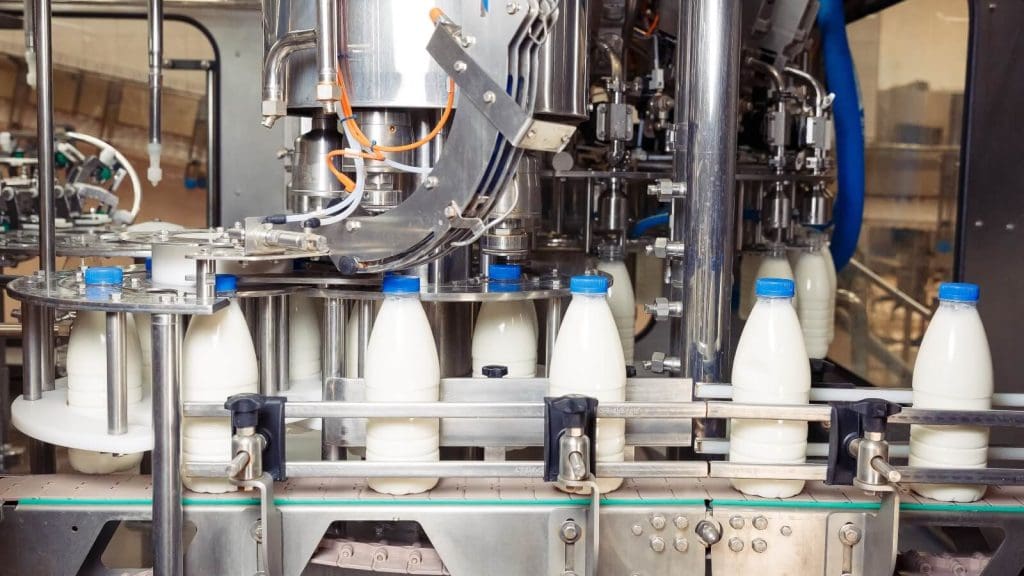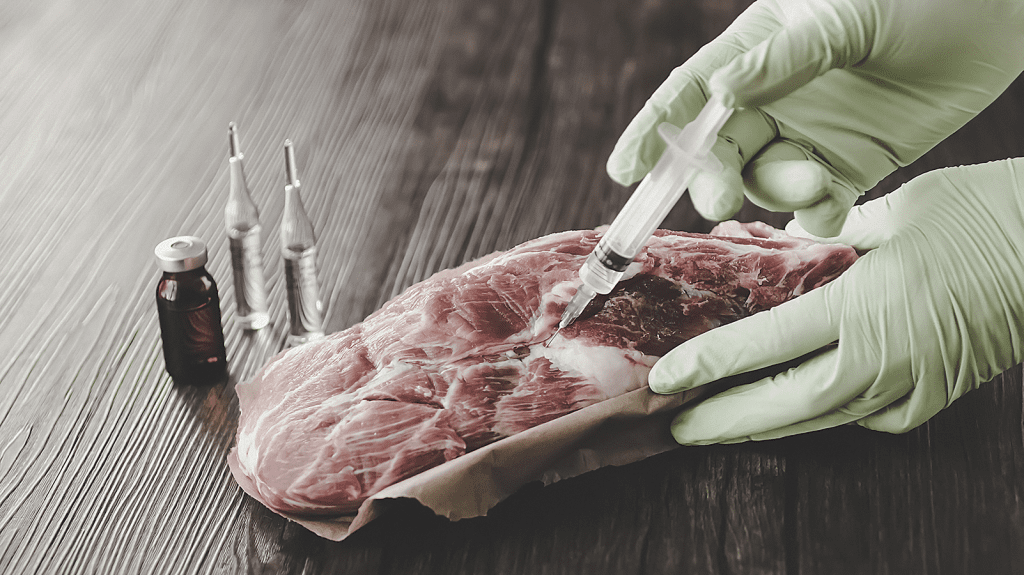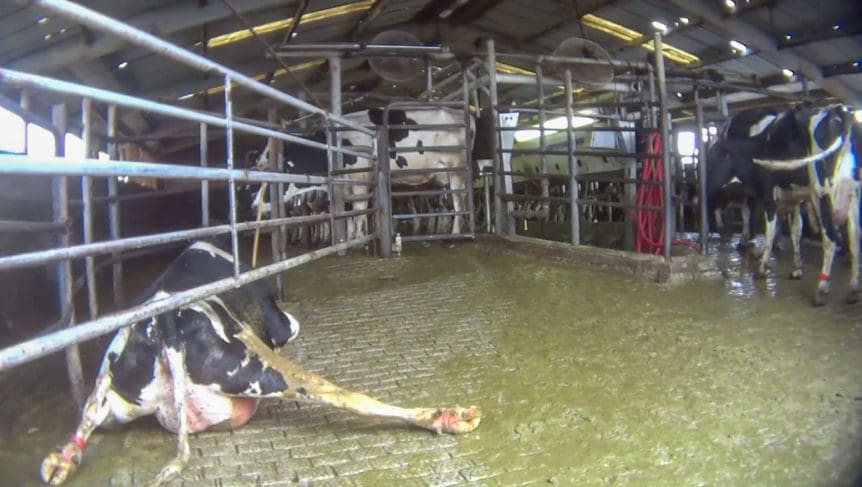Im heutigen industrialisierten Lebensmittelsystem ist die Massentierhaltung zur vorherrschenden Methode zur Herstellung von Fleisch und Milchprodukten geworden. Diese Massenproduktionsmethode hat jedoch Bedenken hinsichtlich ihrer Auswirkungen auf die menschliche Gesundheit geweckt.

Die Auswirkungen von Fleisch und Milchprodukten aus Massentierhaltung auf die menschliche Gesundheit
Fleisch- und Milchprodukte aus Massentierhaltung werden oft mit negativen Auswirkungen auf die Gesundheit in Verbindung gebracht. Hier sind einige wichtige Punkte, die Sie berücksichtigen sollten:
- Der Verzehr von Fleisch und Milchprodukten aus Massentierhaltung kann das Risiko chronischer Krankheiten erhöhen.
- Ein hoher Gehalt an gesättigten Fettsäuren in Fleisch und Milchprodukten aus Massentierhaltung kann zu Herzerkrankungen führen.
- Fleisch und Milchprodukte aus Massentierhaltung können schädliche Chemikalien und Zusatzstoffe enthalten.
- Im Vergleich zu Bio- und Weideprodukten haben Fleisch und Milchprodukte aus Massentierhaltung möglicherweise einen geringeren Nährwert.
Der Zusammenhang zwischen Fleisch aus Massentierhaltung und Milchprodukten sowie chronischen Krankheiten
Untersuchungen haben einen Zusammenhang zwischen dem Verzehr von Fleisch und Milchprodukten aus Massentierhaltung und einem erhöhten Risiko für chronische Krankheiten gezeigt.
Hier sind einige wichtige Punkte, die Sie berücksichtigen sollten:
- Fleisch und Milchprodukte aus Massentierhaltung enthalten oft einen hohen Gehalt an ungesunden Fetten und Cholesterin.
- Der Verzehr übermäßiger Mengen von Fleisch und Milchprodukten aus Massentierhaltung kann zu Fettleibigkeit und Diabetes führen.
- Fleisch und Milchprodukte aus Massentierhaltung werden mit einem erhöhten Risiko für bestimmte Krebsarten in Verbindung gebracht.
- Die Reduzierung des Verzehrs von Fleisch und Milchprodukten aus Massentierhaltung kann dazu beitragen, chronischen Krankheiten vorzubeugen.
Die Rolle von Antibiotika in Fleisch und Milchprodukten aus Massentierhaltung verstehen
Um das Wachstum zu fördern und Krankheiten vorzubeugen, werden Tieren in Massentierhaltung häufig Antibiotika verabreicht. Allerdings kann dieser weit verbreitete Einsatz von Antibiotika in der Massentierhaltung schwerwiegende Folgen sowohl für die menschliche Gesundheit als auch für die Umwelt haben.
Der übermäßige Einsatz von Antibiotika in der Massentierhaltung kann zur Antibiotikaresistenz beim Menschen beitragen. Wenn Tiere kontinuierlich geringen Mengen an Antibiotika ausgesetzt sind, können Bakterien Resistenzen gegen diese Medikamente entwickeln. Das bedeutet, dass bei einer Infektion des Menschen mit diesen antibiotikaresistenten Bakterien herkömmliche Antibiotika bei der Behandlung der Infektionen möglicherweise nicht mehr wirksam sind.
Auch der Verzehr von Fleisch und Milchprodukten aus Massentierhaltung kann dazu führen, dass Menschen antibiotikaresistenten Bakterien ausgesetzt werden. Diese Bakterien können in den Endprodukten vorhanden sein und eine Gefahr für die menschliche Gesundheit darstellen. Darüber hinaus können Antibiotikarückstände in Fleisch und Milchprodukten aus Massentierhaltung schädliche Auswirkungen auf die menschliche Gesundheit haben.
Die Wahl organischer und antibiotikafreier Optionen kann dazu beitragen, die Antibiotikabelastung zu reduzieren. Indem Sie Landwirte unterstützen, die dem verantwortungsvollen Einsatz von Antibiotika Priorität einräumen, können Sie dazu beitragen, die Ausbreitung von Antibiotikaresistenzen einzudämmen und die Gesundheit von Mensch und Tier zu schützen.
Exposition gegenüber Hormonen sowie Fleisch und Milchprodukten aus Massentierhaltung

Tieren in Massentierhaltung werden häufig Hormone verabreicht, um das Wachstum zu fördern und die Milchproduktion zu steigern. Das bedeutet, dass der Verzehr von Fleisch und Milchprodukten aus Massentierhaltung dazu führen kann, dass Menschen künstlichen Hormonen ausgesetzt werden. Untersuchungen haben gezeigt, dass die Exposition gegenüber Hormonen in Fleisch und Milchprodukten aus Massentierhaltung beim Menschen zu Hormonstörungen führen kann.
Darüber hinaus gibt es Studien, die auf einen möglichen Zusammenhang zwischen hormonbehandeltem Fleisch und Milchprodukten und bestimmten Krebsarten hinweisen. Die in der Massentierhaltung verwendeten künstlichen Hormone können möglicherweise das natürliche Hormongleichgewicht in unserem Körper stören, was langfristige Auswirkungen auf die Gesundheit haben kann.
Um die Hormonbelastung zu minimieren, ist es ratsam, sich für hormonfreie und biologische Fleisch- und Milchprodukte zu entscheiden. Bei diesen Alternativen steht das Wohlergehen der Tiere im Vordergrund und die Verwendung künstlicher Hormone wird minimiert, was den Verbrauchern eine sicherere Wahl bietet.

Fleisch und Milchprodukte aus Massentierhaltung und das Risiko lebensmittelbedingter Krankheiten
Fleisch und Milchprodukte aus Massentierhaltung bergen möglicherweise ein höheres Risiko für lebensmittelbedingte Krankheiten. Unsachgemäße Handhabung und Hygienepraktiken in der Massentierhaltung können zu Kontaminationen führen. Der Verzehr von kontaminiertem Fleisch und Milchprodukten aus Massentierhaltung kann zu Lebensmittelvergiftungen und Magen-Darm-Infektionen führen.
Methoden der Massentierhaltung können die Wahrscheinlichkeit einer bakteriellen Kontamination in Fleisch und Milchprodukten erhöhen. Um das Risiko lebensmittelbedingter Krankheiten zu verringern, sollten die richtigen Koch- und Lagerungspraktiken befolgt werden.
Die Umweltauswirkungen der Fleisch- und Milchproduktion in Massentierhaltung
Massentierhaltung trägt zur Entwaldung und Zerstörung von Lebensräumen bei. Der intensive Ressourcenverbrauch in der Massentierhaltung hat erhebliche Auswirkungen auf die Umwelt. Massentierhaltung ist eine Hauptquelle für Treibhausgasemissionen und den Klimawandel. Verschmutzung durch Massentierhaltung kann Wasserquellen verunreinigen und Ökosysteme schädigen. Der Übergang zu einer nachhaltigen und regenerativen Landwirtschaft kann dazu beitragen, die Auswirkungen auf die Umwelt zu mildern.
Massentierhaltung und Antibiotikaresistenz: Ein globales Problem
Der übermäßige Einsatz von Antibiotika in der Massentierhaltung ist ein globales Problem für die öffentliche Gesundheit. Antibiotikaresistente Bakterien können sich über die Nahrungskette verbreiten und eine Gefahr für die menschliche Gesundheit darstellen. Da Tieren in Massentierhaltung häufig Antibiotika verabreicht werden, um das Wachstum zu fördern und Krankheiten vorzubeugen, führt die ständige Exposition gegenüber diesen Medikamenten zur Entwicklung antibiotikaresistenter Bakterien.
Die Reduzierung des Einsatzes von Antibiotika in der Massentierhaltung ist von entscheidender Bedeutung, um Antibiotikaresistenzen zu bekämpfen. Um einen verantwortungsvollen Einsatz von Antibiotika in der Fleisch- und Milchindustrie sicherzustellen, sind strengere Vorschriften und Überwachungen erforderlich. Es ist wichtig, die Verbraucher über die Risiken antibiotikaresistenter Bakterien in Fleisch und Milchprodukten aus Massentierhaltung aufzuklären und darüber zu informieren, wie wichtig es ist, biologische und antibiotikafreie Optionen zu wählen, um die Antibiotikaexposition zu minimieren.
Die Grausamkeit der Massentierhaltung in der Fleisch- und Milchindustrie
Massentierhaltung ist oft mit grausamer und unmenschlicher Behandlung von Tieren verbunden. Tiere in Massentierhaltungen sind auf engstem Raum eingesperrt und Stressbedingungen ausgesetzt. Bei den intensiven Produktionsmethoden der Massentierhaltung steht der Profit über dem Tierwohl. Tieren in der Massentierhaltung werden natürliche Verhaltensweisen vorenthalten und sie leiden unter physischen und psychischen Belastungen. Die Entscheidung, tierversuchsfreie und ethisch einwandfreie Fleisch- und Milchprodukte zu unterstützen, ist eine mitfühlende Entscheidung.

Fleisch- und Milchalternativen aus Massentierhaltung: Gesündere und ethischere Optionen
Glücklicherweise gibt es viele Alternativen zu Fleisch und Milchprodukten aus Massentierhaltung, die sowohl gesünder als auch ethischer sind. Wenn Sie sich für diese Alternativen entscheiden, können Sie weiterhin die ernährungsphysiologischen Vorteile von Fleisch und Milchprodukten genießen, ohne die negativen Auswirkungen auf die Gesundheit und die Grausamkeiten, die mit der Massentierhaltung einhergehen.
Pflanzliche Alternativen wie Tofu, Tempeh und Seitan bieten ein breites Nährstoffspektrum und können in verschiedenen Gerichten als Fleischersatz verwendet werden. Diese pflanzlichen Proteine sind cholesterinfrei und enthalten weniger gesättigte Fettsäuren, was sie zu einer gesünderen Wahl für Ihre Herzgesundheit macht. Darüber hinaus werden sie in der Regel mit nachhaltigeren Anbaumethoden hergestellt, wodurch die Gesamtauswirkungen auf die Umwelt verringert werden.
Für diejenigen, die immer noch lieber tierische Produkte konsumieren, stehen auch Optionen für Fleisch und Milchprodukte aus ethischer Tier- und Weidehaltung zur Verfügung. Bei diesen Alternativen steht das Wohlergehen der Tiere im Vordergrund und ermöglicht ihnen, sich frei zu bewegen und natürliche Verhaltensweisen auszuüben. Indem Sie Betriebe unterstützen, die dem Tierschutz Priorität einräumen, können Sie zu einem mitfühlenderen und ethischeren Lebensmittelsystem beitragen.
Auch die Erforschung alternativer Proteinquellen wie Hülsenfrüchte, Nüsse und Samen kann für eine abwechslungsreiche und nährstoffreiche Ernährung sorgen. Die Einbeziehung dieser pflanzlichen Proteinquellen in Ihre Mahlzeiten kann dazu beitragen, die Abhängigkeit von Fleisch und Milchprodukten aus Massentierhaltung zu verringern und gleichzeitig Ihren Nährstoffbedarf zu decken.
Durch die Wahl gesünderer und ethischer Alternativen zu Fleisch und Milchprodukten aus Massentierhaltung können Sie einen positiven Einfluss auf Ihre Gesundheit, das Wohlergehen der Tiere und die Umwelt haben.
Förderung einer nachhaltigen Landwirtschaft: Verringerung der Abhängigkeit von Fleisch und Milchprodukten aus der Massentierhaltung
Der Übergang zu einer nachhaltigen Landwirtschaft ist unerlässlich, um die Abhängigkeit von Fleisch und Milchprodukten aus Massentierhaltung zu verringern. Durch die Unterstützung lokaler und Biobauern können wir umweltfreundlichere und ethischere Lebensmittelproduktionspraktiken .
Die Förderung von Richtlinien, die nachhaltige landwirtschaftliche Praktiken in den Vordergrund stellen, kann zu positiven Veränderungen in der Branche führen. Regierungen und Organisationen können Anreize und Unterstützung für Landwirte bieten, die nachhaltige Methoden anwenden.
Es ist von entscheidender Bedeutung, das Bewusstsein für die Umwelt- und Gesundheitsauswirkungen der Massentierhaltung zu schärfen. Durch Aufklärung und Interessenvertretung können wir Einzelpersonen in die Lage versetzen, fundierte Entscheidungen zu treffen und die Vorteile einer nachhaltigen Landwirtschaft zu verstehen.
Die Entscheidung, weniger Fleisch und Milchprodukte aus Massentierhaltung zu konsumieren, kann erhebliche Auswirkungen auf die Branche haben. Indem wir uns für pflanzliche Alternativen, Optionen aus ethischem Anbau und Weidehaltung entscheiden und alternative Proteinquellen erkunden, können wir zu einem nachhaltigeren und humaneren Lebensmittelsystem beitragen.
Gemeinsam können wir eine nachhaltige Landwirtschaft fördern und unsere Abhängigkeit von Fleisch und Milchprodukten aus Massentierhaltung verringern, wobei wir der Gesundheit unseres Planeten, der Tiere und uns selbst Priorität einräumen.
















































